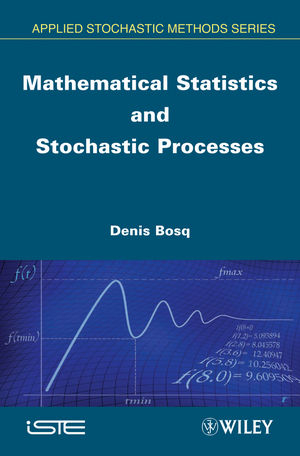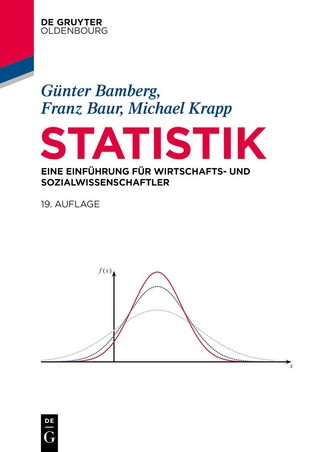
Mathematical Statistics and Stochastic Processes
ISTE Ltd and John Wiley & Sons Inc (Verlag)
978-1-84821-361-6 (ISBN)
- Titel z.Zt. nicht lieferbar
- Versandkostenfrei
- Auch auf Rechnung
- Artikel merken
Generally, books on mathematical statistics are restricted to the case of independent identically distributed random variables. In this book however, both this case AND the case of dependent variables, i.e. statistics for discrete and continuous time processes, are studied. This second case is very important for today’s practitioners.
Mathematical Statistics and Stochastic Processes is based on decision theory and asymptotic statistics and contains up-to-date information on the relevant topics of theory of probability, estimation, confidence intervals, non-parametric statistics and robustness, second-order processes in discrete and continuous time and diffusion processes, statistics for discrete and continuous time processes, statistical prediction, and complements in probability.
This book is aimed at students studying courses on probability with an emphasis on measure theory and for all practitioners who apply and use statistics and probability on a daily basis.
Denis Bosq is Professor emeritus Université Pierre et Marie Curie (Paris 6) France.
Preface xiii
PART 1. MATHEMATICAL STATISTICS 1
Chapter 1. Introduction to Mathematical Statistics 3
1.1. Generalities 3
1.2. Examples of statistics problems 4
Chapter 2. Principles of Decision Theory 9
2.1. Generalities 9
2.2. The problem of choosing a decision function 11
2.3. Principles of Bayesian statistics 13
2.4. Complete classes 17
2.5. Criticism of decision theory – the asymptotic point of view 18
2.6. Exercises 18
Chapter 3. Conditional Expectation 21
3.1. Definition 21
3.2. Properties and extension 22
3.3. Conditional probabilities and conditional distributions 24
3.4. Exercises 26
Chapter 4. Statistics and Sufficiency 29
4.1. Samples and empirical distributions 29
4.2. Sufficiency 31
4.3. Examples of sufficient statistics – an exponential model 33
4.4. Use of a sufficient statistic 35
4.5. Exercises 36
Chapter 5. Point Estimation 39
5.1. Generalities 39
5.2. Sufficiency and completeness 42
5.3. The maximum-likelihood method 45
5.4. Optimal unbiased estimators 49
5.5. Efficiency of an estimator 56
5.6. The linear regression model 65
5.7. Exercises 68
Chapter 6. Hypothesis Testing and Confidence Regions 73
6.1. Generalities 73
6.2. The Neyman–Pearson (NP) lemma 75
6.3. Multiple hypothesis tests (general methods) 80
6.4. Case where the ratio of the likelihoods is monotonic 84
6.5. Tests relating to the normal distribution 86
6.6. Application to estimation: confidence regions 86
6.7. Exercises 90
Chapter 7. Asymptotic Statistics 101
7.1. Generalities 101
7.2. Consistency of the maximum likelihood estimator 103
7.3. The limiting distribution of the maximum likelihood estimator 104
7.4. The likelihood ratio test 106
7.5. Exercises 108
Chapter 8. Non-Parametric Methods and Robustness 113
8.1. Generalities 113
8.2. Non-parametric estimation 114
8.3. Non-parametric tests 117
8.4. Robustness 121
8.5. Exercises 124
PART 2. STATISTICS FOR STOCHASTIC PROCESSES 131
Chapter 9. Introduction to Statistics for Stochastic Processes 133
9.1. Modeling a family of observations 133
9.2. Processes 134
9.3. Statistics for stochastic processes 137
9.4. Exercises 138
Chapter 10. Weakly Stationary Discrete-Time Processes 141
10.1. Autocovariance and spectral density 141
10.2. Linear prediction and Wold decomposition 144
10.3. Linear processes and the ARMA model 146
10.4. Estimating the mean of a weakly stationary process 149
10.5. Estimating the autocovariance 151
10.6. Estimating the spectral density 151
10.7. Exercises 155
Chapter 11. Poisson Processes – A Probabilistic and Statistical Study 163
11.1. Introduction 163
11.2. The axioms of Poisson processes 164
11.3. Interarrival time 166
11.4. Properties of the Poisson process 168
11.5. Notions on generalized Poisson processes 170
11.6. Statistics of Poisson processes 172
11.7. Exercises 177
Chapter 12. Square-Integrable Continuous-Time Processes 183
12.1. Definitions 183
12.2. Mean-square continuity 183
12.3. Mean-square integration 184
12.4. Mean-square differentiation 187
12.5. The Karhunen–Loeve theorem 188
12.6. Wiener processes 189
12.7. Notions on weakly stationary continuous-time processes 195
12.8. Exercises 197
Chapter 13. Stochastic Integration and Diffusion Processes 203
13.1. Itô integral 203
13.2. Diffusion processes 206
13.3. Processes defined by stochastic differential equations and stochastic integrals 212
13.4. Notions on statistics for diffusion processes 215
13.5. Exercises 216
Chapter 14. ARMA Processes 219
14.1. Autoregressive processes 219
14.2. Moving average processes 223
14.3. General ARMA processes 224
14.4. Non-stationary models 226
14.5. Statistics of ARMA processes 228
14.6. Multidimensional processes 232
14.7. Exercises 233
Chapter 15. Prediction 239
15.1. Generalities 239
15.2. Empirical methods of prediction 240
15.3. Prediction in the ARIMA model 242
15.4. Prediction in continuous time 244
15.5. Exercises 245
PART 3. SUPPLEMENT 249
Chapter 16. Elements of Probability Theory 251
16.1. Measure spaces: probability spaces 251
16.2. Measurable functions: real random variables 253
16.3. Integrating real random variables 255
16.4. Random vectors 259
16.5. Independence 261
16.6. Gaussian vectors 262
16.7. Stochastic convergence 264
16.8. Limit theorems 265
Appendix. Statistical Tables 267
A1.1. Random numbers 267
A1.2. Distribution function of the standard normal distribution 268
A1.3. Density of the standard normal distribution 269
A1.4. Percentiles (tp) of Student’s distribution 270
A1.5. Ninety-fifth percentiles of Fisher–Snedecor distributions 271
A1.6. Ninety-ninth percentiles of Fisher–Snedecor distributions 272
A1.7. Percentiles (χ2 p) of the χ2 distribution with n degrees of freedom 273
A1.8. Individual probabilities of the Poisson distribution 274
A1.9. Cumulative probabilities of the Poisson distribution 275
A1.10. Binomial coefficients Ck n for n ≤ 30 and 0 ≤ k ≤ 7 276
A1.11. Binomial coefficients Ck n for n ≤ 30 and 8 ≤ k ≤ 15 277
Bibliography 279
Index 281
| Erscheint lt. Verlag | 13.4.2012 |
|---|---|
| Verlagsort | London |
| Sprache | englisch |
| Maße | 161 x 241 mm |
| Gewicht | 585 g |
| Themenwelt | Mathematik / Informatik ► Mathematik ► Statistik |
| Mathematik / Informatik ► Mathematik ► Wahrscheinlichkeit / Kombinatorik | |
| ISBN-10 | 1-84821-361-1 / 1848213611 |
| ISBN-13 | 978-1-84821-361-6 / 9781848213616 |
| Zustand | Neuware |
| Informationen gemäß Produktsicherheitsverordnung (GPSR) | |
| Haben Sie eine Frage zum Produkt? |
aus dem Bereich


